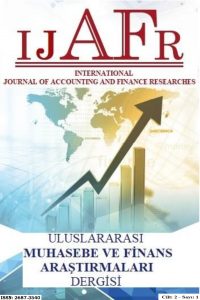THE FUTURE OF AUDITING: RE-DESIGN OF AUDITING IN THE EFFECT OF INDUSTRY 4.0
Öz
It is seen that, as in all sciences, the science of control is also affected by these developments and technological changes are experiencing at a dizzying speed and consequently, even though delayed changes and transformations begin to be experienced. The phenomenon of industry 4.0, starting from Europe, which represents the last stage of today's technological developments and spreading to America and other countries, is designed and implemented within the framework of six principles. These principles are expressed as interoperability, virtualization, localization, real-time capability, service orientation and modularity. One of the main objectives of Industry 4.0 is to contribute to the process of transparency by providing the flexibility of value chains between all business functions such as logistics, production, marketing, accounting, and human resources covering business science. Depending on technological advances, the audit activities should be rearranged within the framework of new generation applications. The benefits of technology such as the collection of comprehensive evidence for the audit, the automation of the process, and the acquisition of comprehensive, concurrent and accurate information to improve the safety and quality of the audit should be maximized. Utilizing the information stored, transmitted and analyzed by Industry 4.0 technology in the audit activities processes will make significant contributions to the reliability, authenticity and usability of the audit. At the same time, the simultaneous processing of data at every stage of the process will ensure that errors and tricks occur to a minimum. This will create a basis for the transparency of the process for all parties and therefore to save time and cost for audit activities. The basic logic of the Industry 4.0 phenomenon envisages simultaneous execution of all processing processes. This situation demonstrates the complexity of the system as well as providing more information and opportunities for making healthier decisions. Within the scope of the study, Industry 4.0 system was evaluated within the framework of the audit process and the effects of system facilities on the audit process were examined. It is expected that the Industry 4.0 system will bring about changes in many aspects such as the diversity and number of evidence, the content of analytical procedures, external confirmations, as a natural consequence of the simultaneous provision of data, disseminating data to stakeholders, and the holistic approach to data analysis.
Anahtar Kelimeler
Kaynakça
- ...
DENETİMİN GELECEĞİ: ENDÜSTRİ 4.0’IN ETKİSİNDE DENETİMİN YENİDEN DİZAYNI
Öz
Teknolojik gelişmelerin baş döndürücü bir hızla yaşandığı günümüzde tüm bilimlerde olduğu gibi denetim biliminin de bu gelişmelerden etkilendiği ve buna bağlı olarak gecikmeli de olsa değişim ve dönüşümler yaşamaya başladığı görülmektedir. Günümüz teknolojik gelişmelerin son evresini temsil eden Avrupa’dan başlayıp Amerika ve diğer ülkelere yayılan endüstri 4.0 olgusu altı ilke çerçevesinde tasarlanıp uygulanmaktadır. Bu ilkeler birlikte çalışabilirlik, sanallaştırma, yerelleşme, gerçek zamanlı yetenek, hizmet oryantasyonu ve modülerlik olarak ifade edilmektedir. Endüstri 4.0'ın sağladığı temel amaçlarından biri de işletme bilimini kapsayan lojistik, üretim, pazarlama, muhasebe, insan kaynakları gibi tüm iş fonksiyonları arasındaki değer zincirlerinin esnekliğini sağlayarak şeffaflaşma sürecine önemli katkılar sunmaktır. Teknolojik ilerlemelere bağlı olarak denetim faaliyetlerinin de yeni nesil uygulamalar çerçevesinde yeniden düzenlenmesi gerekmektedir. Denetime ilişkin kapsamlı kanıtların toplanması, sürecin otomatikleştirilmesi, denetimin güvenliği ve kalitesini yükseltmek amacıyla kapsamlı, eş zamanlı ve doğru bilgilerin elde edilmesi gibi teknolojinin nimetlerinden azami ölçüde faydalanılmalıdır. Endüstri 4.0 teknolojisinin depoladığı, aktardığı ve analiz ettiği bilgilerin denetim faaliyetleri süreçlerinde yararlanılması denetimin güvenilirliğine, gerçekliğine, kullanılabilirliğine önemli katkılar sağlayacaktır. Aynı zamanda sürecin her aşamasında verilerin eş zamanlı olarak işletilmesi hata ve hilelerin en az düzeyde oluşmasını sağlayacaktır. Bu durum tüm taraflar açısından sürecin şeffaflaşmasına dolayısıyla denetim faaliyetlerinin zaman ve maliyet tasarrufu sağlamasına zemin oluşturacaktır. Endüstri 4.0 olgusunun temel mantığı tüm işlem süreçlerinin bir bütün olarak eş zamanlı yürütülmesini öngörmektedir. Bu durum sistemin karmaşıklığını ortaya koyduğu gibi daha sağlıklı kararların alınmasında daha fazla bilgi ve olanaklar sağlayacağı da öngörülmektedir. Çalışma kapsamında Endüstri 4.0 sistemi denetim süreci çerçevesinde değerlendirilmiş ve sistem olanaklarının denetim sürecine etkileri incelenmiştir. Endüstri 4.0 sisteminin eş zamanlı veri sağlama, paydaşlara verileri dağıtma, verilerin analizini bütünsel bir yaklaşımla gerçekleştirmesinin doğal sonucu olarak denetim sürecinde kanıtların çeşitliliği ve sayısını, analitik prosedürlerin içeriğini, dış teyitler gibi birçok konuda değişimleri meydana getireceği beklenmektedir.
Anahtar Kelimeler
Kaynakça
- ...
Ayrıntılar
| Birincil Dil | Türkçe |
|---|---|
| Konular | İşletme |
| Bölüm | Makaleler |
| Yazarlar | |
| Yayımlanma Tarihi | 30 Haziran 2020 |
| Yayımlandığı Sayı | Yıl 2020 Cilt: 2 Sayı: 1 |

Bu eser Creative Commons Atıf-GayriTicari 4.0 Uluslararası Lisansı ile lisanslanmıştır.

